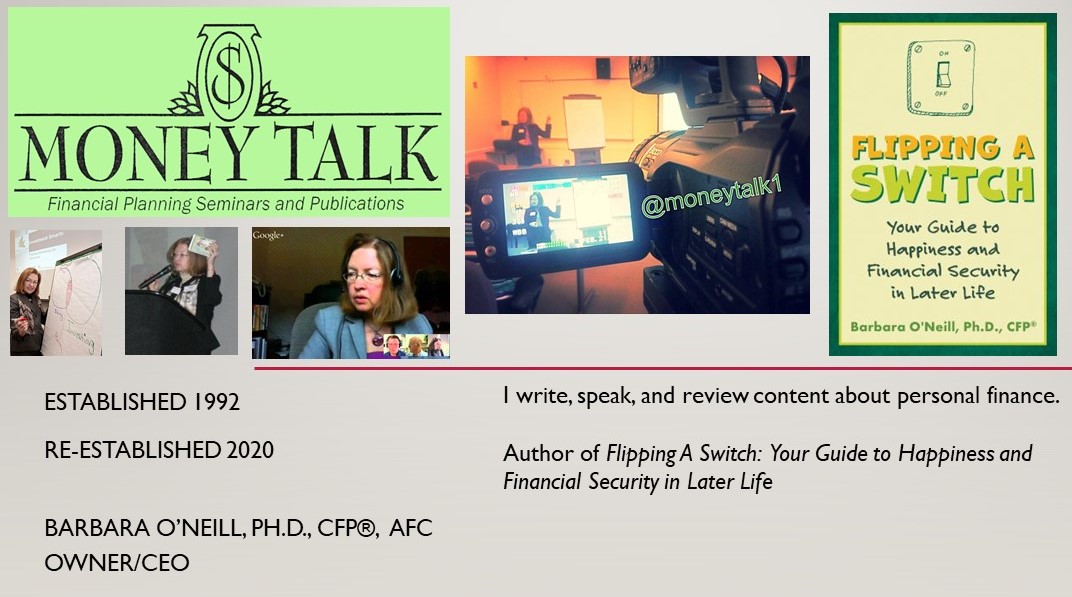Financial resilience is the ability to withstand life events that impact one’s income and/or assets. In everyday language, resiliency is the ability to “roll with the punches” and carry on despite life’s setbacks. Resilient people often “use lemons to make lemonade.”
Some financially stressful events, such as
unemployment, divorce, disability, and health problems affect people
individually. Others, such as the
COVID-19 pandemic, economic recessions, stock market downturns, and acts of
terrorism, affect society as a whole.
Research by Dr. Sharon Danes, a professor
at the University of Minnesota, found that there are five characteristics that
enhance people’s resilience in the face of life’s changes and challenges. These five characteristics are being
positive, focused, flexible, organized, and proactive:
¨
Positive people view
challenges as opportunities. They reframe situations positively and often use
the expression “it could have been a lot
worse” when comparing their misfortune to others.
¨
Focused people determine
where they are headed in the future and stick to their goals so that life
events and other barriers do not deter them.
¨
Flexible people are open to
experimenting with new ideas and different options when faced with uncertainty.
¨ Organized people set priorities and develop structured approaches to manage change and get things done.
¨
Proactive people work with
change rather than defend against it. They anticipate and prepare for what
might happen instead of responding to events after they happen.
Financial resiliency is enhanced with financial resources, such as savings, health insurance, and a good-paying job. Another resource for financial resiliency is one’s human capital. Economists define human capital as all of the knowledge, skills, experiences, and other personal qualities that people have to “sell” to potential employers.
Social capital also increases
financial resiliency. This includes a
support system of family, friends, co-workers, neighbors, and others that can
provide financial assistance, not to mention emotional support, during hard
times. An example is someone driving a
friend to a cancer treatment, thereby saving them the cost and stress of
getting to the hospital on their own.
Commonly recommended financial behaviors
can increase financial resiliency. Below
are five examples:
¨
Maintain a Low Debt-to-Income Ratio- Keep monthly
consumer debt payments (all debts except a mortgage) at 15% or less of monthly
take-home pay. A ratio of 20% or more is
a danger zone. Example: $275 of debt payments ÷ $2,500 of net pay equals a
consumer debt-to-income ratio of 11% (275 divided by 2,500).
¨
Accumulate an Adequate Emergency Fund- Save at least
three month’s expenses. Keep this money
liquid in cash equivalents such as a credit union, money market mutual fund, or
short-term certificate of deposit (CD).
¨
Learn to Earn - Never consider your education or job
training finished. Continue to gain
knowledge and develop new skills to increase human capital and remain employable
in today’s competitive labor market.
¨
Purchase Adequate Insurance- Protect
dependents against the loss of a breadwinner’s income with life insurance and buy
disability insurance to provide continued income following an accident or
illness.
¨
Increase your Financial Knowledge- Learn one new
thing every day about personal finance. Good financial information sources
include magazines, workplace seminars, blogs, podcasts, websites, certified
financial planner® professionals, adult education courses, radio and television
shows, and investment clubs.
For more
information about increasing financial resilience, review this post from the Get Rich Slowly blog.






No comments:
Post a Comment